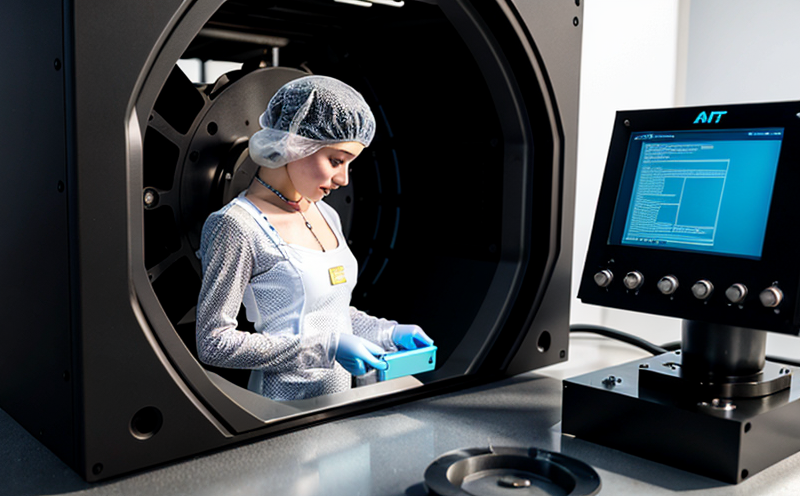ASTM F2977 Process Validation for AM Titanium Alloy Components
The ASTM F2977 standard provides a robust framework for validating additive manufacturing (AM) processes, particularly in the context of titanium alloy components. This process validation ensures that the final product consistently meets specified performance requirements and quality standards. Titanium alloys are highly valued for their strength-to-weight ratio, corrosion resistance, and biocompatibility, making them indispensable in industries such as aerospace, medical devices, and automotive.
The ASTM F2977 methodology focuses on several key aspects of AM process validation:
- Process parameters: The standard specifies the critical parameters that must be validated for each manufacturing step, including laser power settings, scan speed, layer thickness, and post-processing treatments like heat treatment.
- Material characterization: Detailed analysis of the raw titanium alloy powder is required to ensure it meets the necessary purity and particle size distribution requirements.
- Process monitoring: Continuous monitoring during the AM process is essential for capturing real-time data on process variables that can affect final product quality.
- Part validation: Each manufactured part undergoes rigorous inspection, including dimensional checks, mechanical testing, and non-destructive testing (NDT).
The ASTM F2977 protocol also emphasizes the importance of statistical process control (SPC) to ensure that deviations from the specified parameters are detected early in the manufacturing process. This proactive approach helps minimize rework and ensures consistent product quality.
One of the key challenges in AM titanium alloy component production is achieving uniform microstructure across the entire part, as variations can lead to inconsistencies in mechanical properties. The ASTM F2977 validation process addresses this by incorporating advanced imaging techniques such as X-ray computed tomography (CT) and scanning electron microscopy (SEM) to visualize internal structures.
In addition to these technical aspects, the standard also considers the broader implications of process validation for regulatory compliance and customer satisfaction. By adhering to ASTM F2977, manufacturers can demonstrate that their processes are capable of producing parts within specified tolerances, thus enhancing trust with end users who rely on consistent quality.
| Validation Step | Description |
|---|---|
| Process Parameter Identification | Determination of critical process parameters for each manufacturing step. |
| Material Characterization | Analysis of raw titanium alloy powder to ensure it meets specified purity and particle size distribution requirements. |
| Continuous Process Monitoring | Real-time monitoring during the AM process to capture data on critical parameters. |
| Part Validation | In-depth inspection of manufactured parts, including dimensional checks, mechanical testing, and non-destructive testing (NDT). |
The ASTM F2977 standard is particularly beneficial for industries where the quality and reliability of titanium alloy components are paramount. By leveraging this process validation approach, manufacturers can ensure that their products meet stringent industry standards and regulatory requirements.
Industry Applications
- Aerospace: Lightweight structures with high strength requirements.
- Medical Devices: Biocompatible implants requiring precise geometry and mechanical properties.
- Automotive: High-performance components that need to withstand severe conditions.
- Military: Advanced armor systems for enhanced protection.
The ASTM F2977 process validation is widely used across these industries to ensure the quality and reliability of AM titanium alloy components. By adhering to this standard, manufacturers can produce parts with consistent performance characteristics that meet the stringent demands of their respective sectors.
Competitive Advantage and Market Impact
- Enhanced customer trust through demonstrated process capability.
- Increased market competitiveness by meeting the highest industry standards.
- Reduced risk of non-compliance with regulatory requirements.
- Potential for higher pricing due to superior product quality.
The implementation of ASTM F2977 process validation offers significant advantages in terms of both internal and external factors. Internally, it ensures that the manufacturing process is efficient and repeatable, leading to cost savings through reduced scrap rates and improved yield. Externally, it enhances the reputation of the manufacturer, making them a preferred supplier for high-quality components.
The market impact extends beyond individual companies; it contributes to the overall advancement of additive manufacturing technology by setting benchmarks for quality and reliability. This standardization fosters innovation within the industry, encouraging research into new materials and processes that can be validated using ASTM F2977.
Use Cases and Application Examples
The ASTM F2977 process validation for AM titanium alloy components is applicable in various use cases, including:
- Developing new aerospace structures that require lightweight yet durable materials.
- Creating medical implants with intricate geometries that enhance patient outcomes.
- Manufacturing automotive parts that must endure extreme conditions without compromising performance.
An example of a successful application is the production of titanium alloy hip prostheses. By validating the AM process using ASTM F2977, manufacturers can ensure that each implant has uniform microstructure and mechanical properties, which are critical for long-term patient safety and comfort.
| Use Case | Description |
|---|---|
| Aerospace Structures | Production of lightweight yet durable structures that meet strict weight requirements. |
| Medical Implants | Creation of intricate geometries that enhance patient-specific treatment outcomes. |
| Automotive Components | Manufacture of parts that must withstand severe conditions without compromising performance. |
| Military Armor Systems | Development of advanced armor systems for enhanced protection. |
The ASTM F2977 process validation is essential in these use cases as it ensures that the final products meet the necessary quality and performance standards, thereby improving overall product reliability and customer satisfaction.





